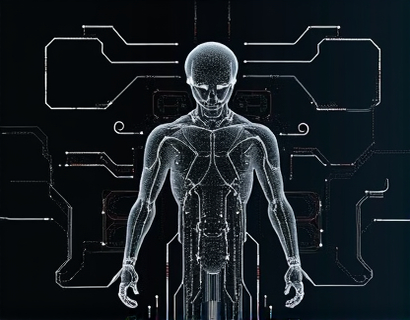AI Accreditation Innovations: Transforming Skill Validation and Career Advancement in the Digital Age
The digital age has ushered in a revolution in the way skills are validated and careers are advanced. With the rapid evolution of technology, particularly in artificial intelligence and machine learning, there is an increasing need for robust and recognized methods to validate the skills and knowledge of tech professionals and students. Traditional certification methods often fall short in the dynamic tech industry, where skills can become obsolete quickly. This is where AI accreditation innovations come into play, offering a transformative approach to skill validation and career development.
One of the key innovations in this space is the development of AI certification platforms that go beyond conventional credentials. These platforms leverage AI technologies to create personalized and task-based certifications, ensuring that the skills and knowledge of individuals are accurately reflected in their professional profiles. This approach not only enhances personal credibility but also provides employers with a more reliable indicator of a candidate's capabilities.
Personalized and Task-Based Certifications
Traditional certifications often follow a one-size-fits-all model, which may not adequately capture the nuanced skills required in specific roles or projects. In contrast, AI accreditation platforms offer personalized certifications based on the completion of specific tasks and educational milestones. This tailored approach ensures that each credential is directly linked to the skills and knowledge gained, providing a more accurate representation of an individual's expertise.
For instance, a tech professional working on a machine learning project could earn a certification that specifically validates their proficiency in a particular algorithm or framework. This not only demonstrates their practical application of the technology but also showcases their ability to apply it in real-world scenarios. Such specialized credentials are highly valued by employers, as they indicate a level of expertise that goes beyond general knowledge.
Enhancing Professional Credibility
The credibility of a professional in the tech industry is often determined by the recognition of their skills and the trustworthiness of their credentials. AI accreditation platforms address this by providing certifications that are not only recognized within the industry but also verified through rigorous assessment processes. These platforms use AI algorithms to design assessments that are both challenging and relevant, ensuring that only those who have truly mastered the material can earn the certification.
Moreover, the use of blockchain technology in these platforms adds an extra layer of security and transparency. Each certification is stored on a blockchain, making it tamper-proof and easily verifiable by employers and other stakeholders. This enhances the professional credibility of the individual, as employers can confidently trust the authenticity of the credentials presented.
Career Advancement Opportunities
The impact of AI accreditation on career advancement is significant. In a competitive job market, having recognized and verifiable credentials can set candidates apart from the crowd. Employers are increasingly looking for professionals who can demonstrate specific skills through credible certifications, rather than relying solely on academic degrees or general experience.
AI accreditation platforms offer a range of certifications that cater to various career paths and levels of expertise. For entry-level professionals, these platforms provide foundational certifications that validate basic skills and knowledge. For mid-career professionals, advanced certifications can demonstrate a deeper understanding and specialized expertise. For those looking to transition into new roles or industries, these platforms offer targeted certifications that highlight transferable skills and new competencies.
Furthermore, the continuous learning and upskilling encouraged by these platforms help professionals stay relevant in a rapidly changing tech landscape. By earning a series of certifications over time, individuals can showcase their commitment to lifelong learning and their ability to adapt to new technologies and trends.
Educational Milestones and Skill Development
AI accreditation platforms not only focus on certifying the end results but also emphasize the learning journey. Educational milestones are designed to guide learners through a structured path of skill development, ensuring a comprehensive understanding of the subject matter. These milestones can include interactive courses, hands-on projects, and peer reviews, all of which contribute to the overall certification.
For example, a learner working towards a certification in data science might progress through a series of milestones, starting with foundational courses in statistics and programming, followed by intermediate modules on data manipulation and visualization, and finally, advanced topics in machine learning and data modeling. Each milestone is assessed through AI-driven evaluations, providing immediate feedback and ensuring that the learner is on the right track.
This approach to skill development is particularly beneficial for self-learners and those who prefer a more flexible and self-paced learning environment. The structured milestones provide a clear roadmap, helping learners stay focused and motivated throughout their educational journey.
Maximizing Educational Potential
The integration of AI in accreditation platforms also enhances the educational experience by providing personalized learning paths and adaptive assessments. AI algorithms analyze the learner's performance and learning style, adjusting the difficulty and content of the materials accordingly. This personalized approach ensures that each learner receives the support they need to succeed, regardless of their starting point.
Additionally, these platforms often offer a wealth of resources beyond the core certifications, including access to industry reports, research papers, and networking opportunities. This comprehensive support system not only aids in the acquisition of new skills but also fosters a deeper understanding of the industry and its trends.
Job Prospects and Employer Perception
The impact of AI accreditation on job prospects is profound. Employers are increasingly recognizing the value of these specialized certifications, as they provide concrete evidence of a candidate's abilities. In many cases, a certification from a reputable AI accreditation platform can be as influential as a degree from a prestigious institution.
Moreover, the specificity of these certifications aligns well with the needs of modern employers. Tech companies often require candidates with specific skills in areas like AI, data analytics, cybersecurity, and cloud computing. By earning certifications that directly address these requirements, professionals can significantly improve their chances of landing their desired roles.
Employer perception of these certifications is also positively influenced by the transparency and rigor of the accreditation process. The use of AI in designing and administering assessments ensures that the certifications are fair, reliable, and relevant to industry standards. This transparency builds trust between employers and candidates, fostering a more efficient and effective hiring process.
Future Trends and Innovations
As AI technology continues to evolve, so too will the innovations in accreditation platforms. One emerging trend is the integration of AI-driven mentorship and coaching services. These services provide learners with personalized guidance and support, helping them navigate their educational journey and overcome challenges more effectively.
Another area of innovation is the development of micro-credentials, which are smaller, more focused certifications that can be earned in a shorter time frame. These micro-credentials allow professionals to quickly acquire specific skills and update their credentials as new technologies emerge, ensuring that their skill sets remain current and relevant.
Furthermore, the collaboration between AI accreditation platforms and educational institutions is expected to grow. Partnerships between these platforms and universities or vocational schools can lead to the creation of accredited programs that combine theoretical knowledge with practical, AI-verified skills. This synergy can enhance the overall quality of education and better prepare students for the demands of the tech industry.
Conclusion
AI accreditation innovations are revolutionizing the way skills are validated and careers are advanced in the digital age. By offering personalized, task-based certifications and leveraging AI technologies, these platforms provide a more accurate and reliable way to demonstrate expertise. The impact on professional credibility, career advancement, and educational development is significant, making these innovations an essential tool for tech professionals and students alike.
As the tech landscape continues to evolve, the role of AI accreditation will only become more prominent. Embracing these innovations can help individuals stay ahead of the curve, ensuring that their skills and knowledge are recognized and valued in the ever-changing world of technology.










































